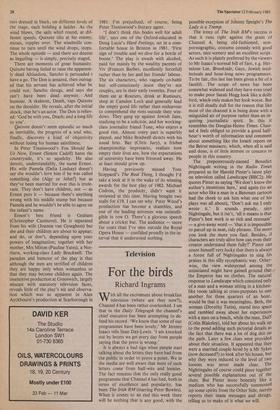Television
For the birds
Richard Ingrarns
with all the excitement about breakfast television (where are they now?), Channel 4 has been rather overlooked. I see that in the Daily Telegraph the channel's chief executive has been attempting to de- fend his record. 'We know that some of our programmes have been lovely,' Mr Jeremy Isaacs tells Sean Day-Lewis. 'I am knocked out by letters we get every day from people saying that the press is wrong.'
It is always a bad sign when people start talking about the letters they have had from the public in order to prove a point. We in the media are well aware that most of such letters come from half-wits and loonies. The fact remains that the only really good programme that Channel 4 has had, both in terms of excellence and popularity, has been The Irish RM (starring Peter Bowles). When it comes to an end this week there will be nothing that is any good, with the possible exception of Johnny Speight's The Lady is a Tramp.
The irony of The Irish RM's success is that it runs right against the grain of Channel 4, being old-fashioned, non- pornographic, costume comedy with good actors, nice scenery and an excellent script. As such it is plainly preferred by the viewers to Mr Isaacs's normal bill of fare, e.g. Her- mione Lee, Brookside, Gays, Jewish intel- lectuals and hour-long news programmes. To be fair, this last has been given a bit of a facelift. The scope of news has been somewhat widened and they have even tried to make poor Sarah Hogg look like a dolly bird, which only makes her look worse. But it is still deadly dull for the reason that like most of the channel it is being done with a misguided air of purpose rather than an in- quiring journalistic spirit. In this it resembles the Douglas-Home Times. Chan- nel 4 feels obliged to provide a good half- hour's worth of information and comment about something like the Israeli report on the Beirut massacre, which, when all is said and done, is of little interest or concern to people in this country.
The preposterously-named Benedict Nightingale writing in the Radio Times prepared us for Harold Pinter's latest play on television called Landscape (BBC2). He quotes Pinter as saying 'We don't know the author's intentions here,' and again (to an actor who like a man in a Bateman cartoon had the cheek to ask him what one of his plays was all about), 'Don't ask me I only wrote it.' It sounds pseudy, says Nightingale, but it isn't, 'all it means is that Pinter's best work is so rich and resonant' — a give-away word — 'that it is impossible to parcel up in neat, tidy phrases. The more you look the more you find. Besides, if characters are truly alive how can even their creator understand them fully?' Pinter can count himself very lucky that there is always a forest full of Nightingales to sing his praises in this silly sycophantic way. Other- wise, the view widespread among the uninitiated might have gained ground that the Emperor has no clothes. The natural response to Landscape which consisted only of a man and a woman sitting in a kitchen- like room talking at cross-purposes to one another for three quarters of an hour, would be that it was meaningless. Beth, the woman (Dorothy Tutin), stared into space and rambled away about her experiences with a man on a beach, while the man, Duff (Colin Blakeley), told her about his walk up to the pond adding such pictorial details as the fact that there was a lot of dog shit on the path. Later a few clues were provided about their situation. It appeared that they were a married couple hired by a Mr Sykes (now deceased?) to look after his house, but why they were reduced to the level of two loonies was never made clear. The Nightingales of course could piece together several possible explanations out of the clues. But Pinter more honestly like a medium who has successfully summoned up some spirits from the Other Side, merely reports their inane messages and shrugs, telling us to make of it what we will.






































 Previous page
Previous page